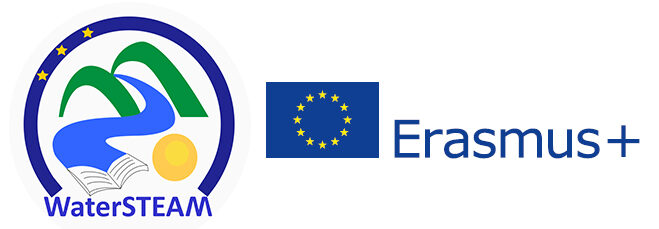The preliminary step of the project was the development of survey tools in the form of questionnaires addressed to students, teachers and stakeholders in Greece, Hungary, Italy and Turkey with the aim to define the knowledge, skills, interests and attitudes of the secondary in STEAM-related school subjects connected to the theme of the project: landscapes, water surfaces, global environmental issues and the stakeholders’ attitudes and interest towards being included as outside experts in the project. The survey questionnaires and the findings reports are accessible in the Methodology Outline (Methodology) as well as in the Reports and excutive Sunnary Reports, accessible in English and in the partners’ languages.
National Reports:
Greece Italy HungaryExecutive summary reports:
Italian Greek HungarianMAIN RESULTS:
The analysis of the responses identified the following main findings regarding attitudes and interests on:
THE ENVIRONMENTAL THEMES OF THE PROJECT:
- students tend to link landscapes primarily to natural surfaces/areas, and usually tend not to consider urban contexts and built environments as landscapes.
- Teachers seem to possess a wider understanding on the concept of landscapes (not exclusively containing natural elements).
- Almost half of the students find low or even no connection between culture/heritage and landscapes.
- There is a moderate knowledge on landscape-related topics among students and among teachers. The top-three familiar topics for students were “human intervention affecting landscapes”, “climate change affecting landscapes” and “difference between natural and artificial landscapes”. With respect to teachers, a major difference compared to the students’ results is that “climate change affecting landscapes” was not mentioned among the top three.
- There is a clearly pronounced interest towards learning and teaching about landscapes. The aggregated data shows a general interest among students, especially when it comes to climate change. The least favourite topic among students is the history of water elements, however even in this case almost half of the respondents would be moderately or very interested in learning about it. As for teachers, although their background lies in different disciplines, they show a great interest in climate change, problems connected to landscapes and benefits of landscape management.
- Students and teachers showed a strong environmental awareness.
- Despite the strong environmental awareness, the personal connection (use) to surrounding landscapes can be rated as relatively low.
- Students and teachers connect landscape-related topics mainly to Geography, however some differences between countries were identified although in Greece and in Italy the dominance of Geography was lower.
- There is a knowledge gap in the teachers’ application of integrated STEAM, especially in Hungary
- Project-based teaching and inquiry-based learning (IBL) have a better awareness among teachers, although it is still rather moderate. It can be established, that there is a huge experience in guiding students to keep deadlines and guide students to communicate ideas verbally.
- Less experience was shown in guiding students to work in teams (group work), and working in collaboration with other teachers. The least expertise was reported in doing fieldwork. This is basically in line with the students’ responses regarding their experience on group work and fieldwork.
INFORMATION AND COMMUNICATION TECHNOLOGIES
- Teachers and students agreed that they like to work as a member of a team.
- They also confirmed that new technologies make school science more interesting.
- Besides using smartphones and tablets, students are also familiar with most of the Office tools (like Word or Power Point), while teachers are mostly familiar with text processing, spreadsheet and presentation software.
- Least experience was reported on geographic information software (GIS) as well as location-based games (LBGs).
- When asking about the interest in learning or teaching about these tools, moderate (or even low) interest was expressed, due to the lack of familiarity with these tools.
COLLABORATION WITH EXTERNAL EXPERTS
The results of the stakeholder-questionnaire investigated the possibility to involve external experts to the implementation of a landscape-related educational methodology in secondary schools. Although the composition of the responding stakeholders varies from country to country, it is true that generally they are involved in environmental issues (protection, planning, research and activism), and almost half of the stakeholders are interested in educational activities as well. Therefore, the positive attitude towards landscape-related issues and the offered methodology is not surprising.
The results show that involving external experts to secondary education is not a novelty, as about half of stakeholders have already cooperated with the education system, but this number fluctuates among countries. When stakeholders are involved in education, the most common cooperation is organizing project-based learning courses, clubs or study classes. Usually, these activities are focusing on environmental protection, but water management was also frequent.
Although there is a considerable amount of previous experience, the majority of stakeholders are not familiar with the STEAM approach, and the results reveal an existing knowledge gap regarding these methodologies.
Stakeholders could act as external experts, giving answers and inspiration to topics that are in line with their daily routines. The results confirmed that this seems feasible: the majority of stakeholders agreed that formal education should put more emphasis on the topic of landscape management and that experts should collaborate with secondary education and contribute to the learning process.
Questionnaires:
If you want to use our online questionnaires, you have to contact the Hungarian partner to get the raw data; otherwise, print the questionnaires available in the Annex of the Methodology Guide.
Students:
English: (ID 35824) http://surveyor.rkk.hu/index.php?sid=35824&lang=en
Hungarian: (ID 58333) http://surveyor.rkk.hu/index.php?sid=58333&lang=hu
Italian: (ID 95956) http://surveyor.rkk.hu/index.php?sid=95956&lang=it
Greek: (ID 11327) http://surveyor.rkk.hu/index.php?sid=11327&lang=el
Teachers:
English: (ID 15914) http://surveyor.rkk.hu/index.php?sid=15914&lang=en
Hungarian: (ID 93787) http://surveyor.rkk.hu/index.php?sid=93787&lang=hu
Italian: (ID 82546) http://surveyor.rkk.hu/index.php?sid=82546&lang=it
Greek: (ID 84193) http://surveyor.rkk.hu/index.php?sid=84193&lang=el
Stakeholders:
Hungarian: (ID 41442) http://surveyor.rkk.hu/index.php?sid=41442&lang=hu
Italian: (ID 77579): http://surveyor.rkk.hu/index.php?sid=77579&lang=it
Greek: (ID 29339) http://surveyor.rkk.hu/index.php?sid=29339&lang=el
